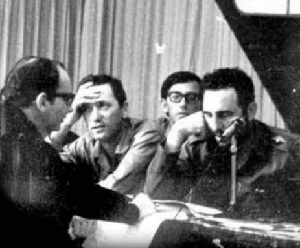 During the 60th year of its existence, Uneac continues to not only dialogue with established writers and artists, but continues, as well, to decentralize important artistic and literary events and include in this open, revolutionary debate even the most modest in communities across the island
During the 60th year of its existence, Uneac continues to not only dialogue with established writers and artists, but continues, as well, to decentralize important artistic and literary events and include in this open, revolutionary debate even the most modest in communities across the island
When the Union of Cuban Writers and Artists (Uneac) was founded on August 22, 1961, the true face of the socio-cultural changes that would completely transform the status quo suffered for generations of Cubans began to emerge.
These transformations were described by intellectuals as a true revolution within a revolution, and that Fidel had already announced, in his “Words to intellectuals,” in June of that same year – barely taking time to shake off the dust and shrapnel smoke of Playa Giron – when in the conclusions of that great meeting he stated: “Soon you are going to establish an artists’ association, you are going to attend a congress,” and at that very moment he called for an unprecedented offensive against the evils of pre-revolutionary society, which quashed the creative spirit of the people. “We are going to wage a war against ignorance. We are going to wage a battle against the lack of culture. We are going to unleash an irreconcilable campaign against the lack of culture and we are going to fight against it and we are going to display our weapons,” he said, pluralizing this call that the young revolution made to its honest creators, willing to sacrifice everything in favor of the education of the most humble.
This historic meeting, held at José Martí National Library, was the preamble to what was coming in the field of art and literature. While there, through open and productive dialogue, Cuba’s cultural policy was drafted, in the most remote corners of the island the colossal battle against illiteracy, backwardness and the myth of geographic fatalism was being waged. Thus, in the course of barely a year, the people discovered the magic of reading and, with it, the source of all beliefs, of all knowledge, that would save the Revolution for posterity.
And so powerful was the admiration of Cubans, shaped by the pleasure of serving and human ethics, when their aspirations – disregarded for centuries -, suddenly found a real place in the humanism of a revolution, achieved on the basis of ideas forged in truth and altruism. It was during these years, when aspirations exceeded the real resources available to achieve the goals of the young revolutionary government in the field of culture, that the film industry, the Ballet School, the National Art School, the Cuban Book Institute were born; publishing was nationalized; libraries, cultural centers and movie theaters were opened across the length and breadth of the archipelago; radio and television programming was strengthened in favor of entertainment and education of an increasingly inclusive society.
As never before, the children of workers and peasants had access to (re)creation. Art and literature were no longer the privilege of a few, but the right of the entire people. The Revolution was beginning to build a country with the support of its hard-working, educated and spiritually sensitive people.
During the 60th year of its existence, Uneac continues to dialogue not only with writers and artists who have established a position within the great centers of culture, but continues, as well, to decentralize important artistic and literary events and include in this open, revolutionary debate even the most modest in municipalities and communities, however distant they may seem geographically. This right to participate in the dialogue to which we have been summoned is key to continuing the construction of the country, alongside the Revolution.
Fidel concluded his remarks at the 1961 meeting with the statement: “Fear other, much harsher judges, fear the judges of posterity, fear the future generations!”
So let us continue our dialogue. I, too, with the intention Whitman gave the pronoun, have the floor in this incessant battle for truth.
(Taken from Granma)